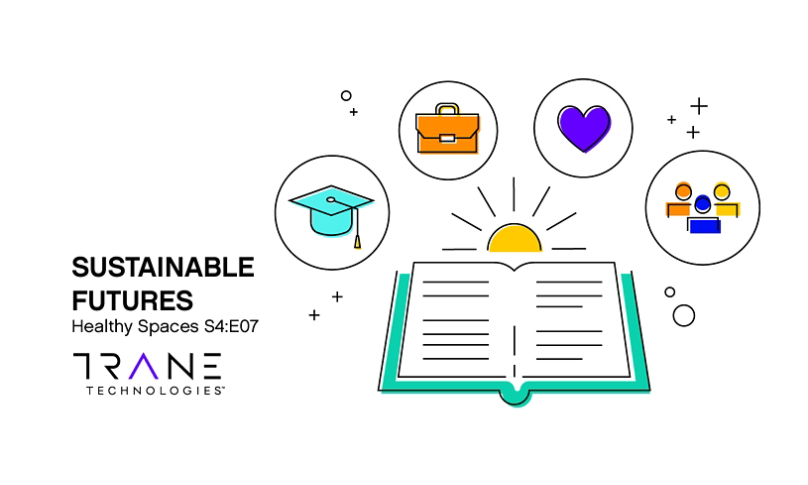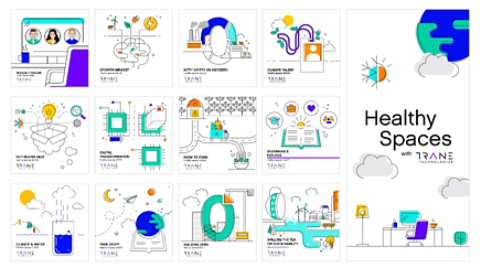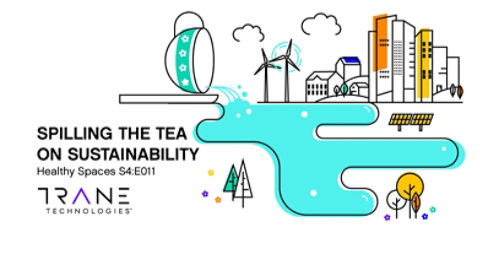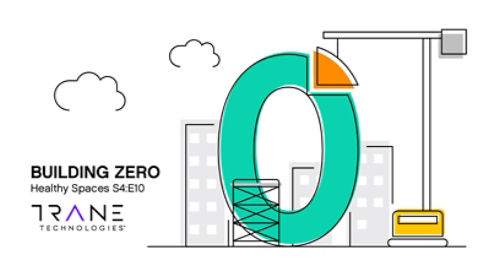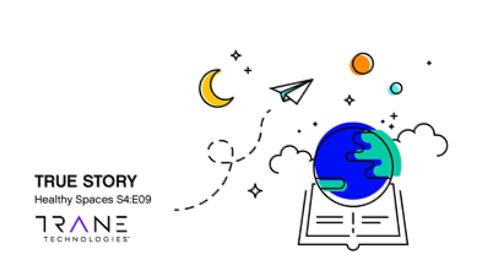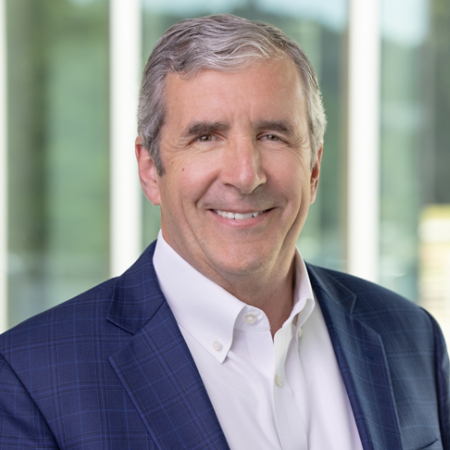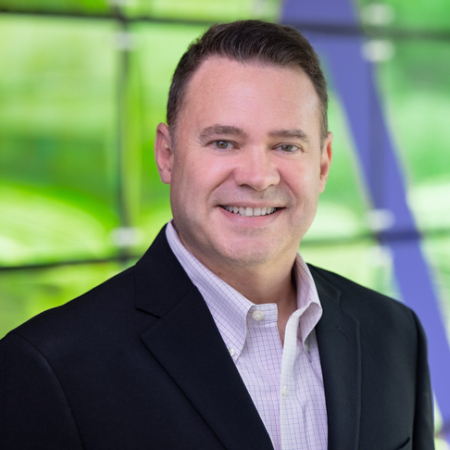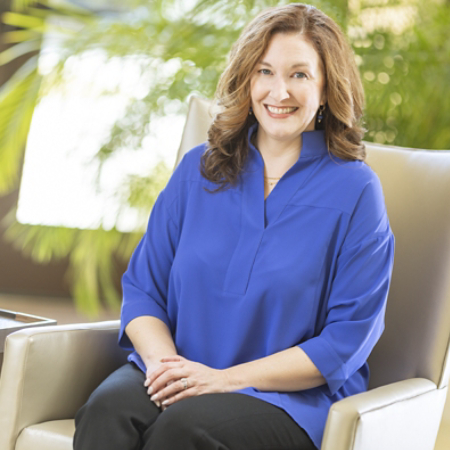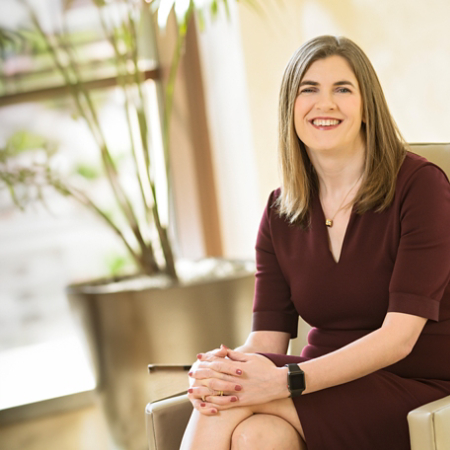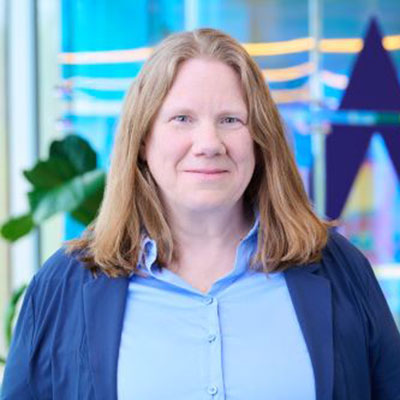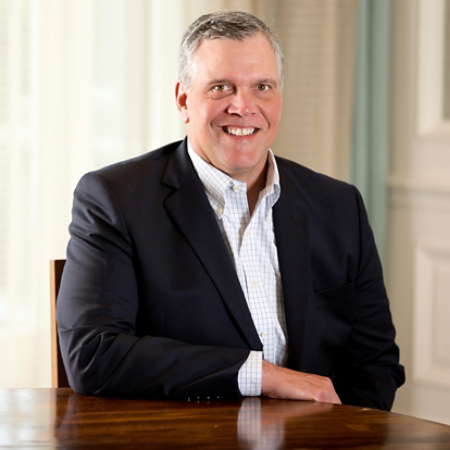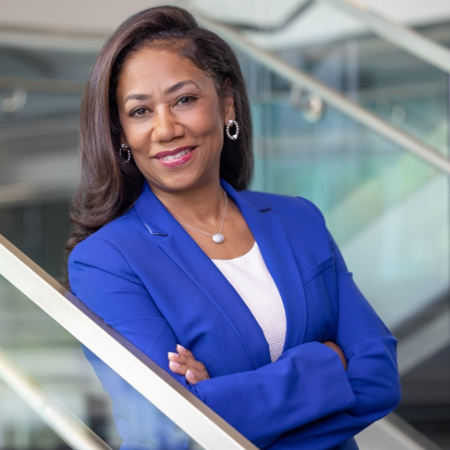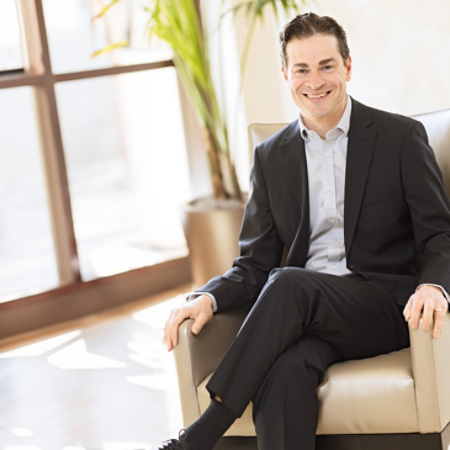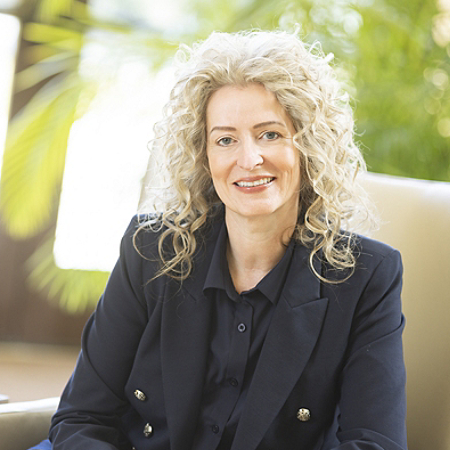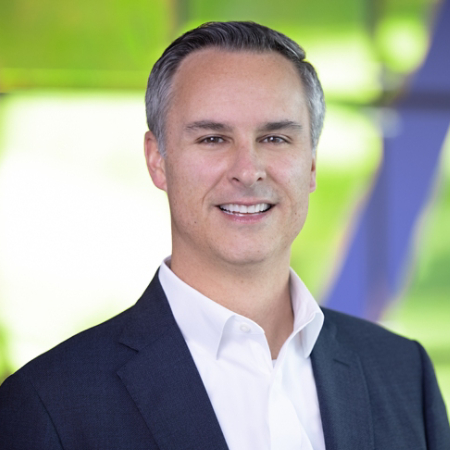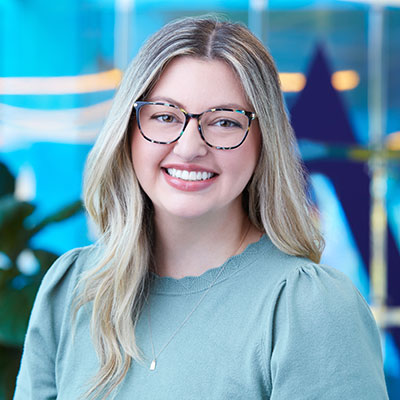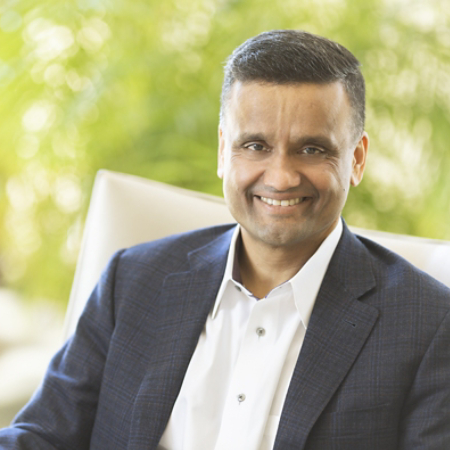[00:00:00] Dominique: As world leaders, entrepreneurs, and scientists all strive to solve for climate change, we all have one purpose in common, to build a sustainable future for the communities of today and the generations of tomorrow. So, how can we empower the next generation to continue to build a more sustainable future?
[00:00:23] Courtney Clague: We like to teach things about like the interactions between ocean currents and air masses. We talk about human activities and some of the ways that we make this applicable and immersive to our students’ lives are through resources like Sustainable Futures, which is an interactive classroom tool. So, they have different features like the virtual field trip and it kind of brings it to them, but the website also has things like educator guides and also like family resources for ideas of sustainability goals that students could do at home.
[00:00:56] Alyssa Sharpe: When we pull both our teachers and our students about what they want to teach and what they care about learning, climate innovation is one that always comes to the top of mind because they care about where we live, how we live and want to make the world a better place for the next generation. So, it's a topic that's really near and dear to a lot of peoples’ hearts.
[00:01:16] Dominique: You just heard from Courtney Clague, a science teacher from Tyler, Texas, and Alyssa Sharpe, CEO of Digi-Bridge, a STEM nonprofit organization.
[00:01:27] Dominique: We'll also be speaking with Deidra Parrish Williams, Director of Citizenship and Community Engagements at Trane Technologies. I'm Dominique Silva, and you're listening to Healthy Spaces. The podcast exploring how technology and innovation are transforming the spaces where we live, learn, work, and play.
[00:01:47] Dominique: In today's episode, we're going into the classroom to see how educators are using creative approaches to help kids connect to sustainability and technology.
[00:01:58] Dominique: We'll also hear why it's so important for forward thinking companies to support the next generation of climate innovators.
[00:02:12] Dominique: To start us off, we turn to Courtney, a science teacher in Texas who's been using a platform called Sustainable Futures to help engage her students on the topic of sustainability
[00:02:24] Courtney Clague: I am an eighth-grade physical science teacher from Tyler, Texas. Three Lakes Middle School is where I teach at. We have sixth, seventh and eighth graders. I mostly work with 13- to 14-year-olds at that school. Last year, I was nominated by Tyler ISD for the Texas Incentive Allotment, which is a program run through the Texas Education Agency and Texas Tech University, where I received a designation as a recognized teacher by the state. So yeah, that’s a little bit about me.
[00:02:55] Scott: Physical science teacher in Texas of 8th graders sounds like an almost impossible mission to me. So, tell me, either have special students, or you have a special love for science with 8th graders. Tell me how you do it that gets you a congratulatory note and recognition like you got?
[00:03:13] Courtney Clague: I think it's actually a combination of both. I have specials students. I really love the kids that I get to work with on a yearly day to day basis, but I also do really have a passion for teaching. Some of the strategies that I like to use, we do a lot of hands-on engagement with science. People learn science through doing it. It's a process and a skill that they need to learn to be able to practice it effectively. So, I think getting as many hands-on opportunities as we can, I like to use those. We do a thing called classroom transformations, so instead of going necessarily on a field trip, we turn our classroom into a location. And then, we use a lot of engaging digital games and tools as well to keep kids interested. My students now have always grown up with technology around them. And so, we have to constantly keep that as a tool to keep them engaged.
[00:04:08] Scott: So, I love this idea of changing your classroom around. What are some examples that you’ve done that sounds interesting? What kind of things have you done? I'm trying to think back to my days in science where no one did an immersive background and immersive classroom. So, give me an example.
[00:04:22] Courtney Clague: Okay, this is one of my favorite topics. So, I try to do a classroom transformation every unit that we have. And one of our first units in the year is the 8th graders first delve into chemistry. And what I did this past year was transform my classroom into a potions lab that was inspired by Harry Potter. So, in this lab, the students got to do six different chemical reaction stations where they explored chemical reactions, but they were all set to themes from Harry Potter. So, it was really nice for students to come in, and I had the brick like little tarps hanging down. So, they walked through like they were going through the platform and entered Hogwarts, and they got sorted into their different houses using an acid and bases like simulation. So, they really got into it, and it made their learning impactful and meaningful, and it stuck with them for the whole year. Another example that we did is I turned my classroom into the three lakes museum of natural science. So, we did that to learn about our geology unit. And we even got fossils and different gems and rocks donated to us by our Gem and Mineral Society and it's really nice to have that community partnership with companies like that, and especially like Trane that always reach out and help us so much with our education and with resources that we're able to provide these opportunities for our students that let them really just dive in. And, like I said, become immersed in their learning experience because that's the things that they remember, not just wrote memorization on a worksheet.
[00:06:06] Scott: You make me want to go back to eighth grade science. What about these big topics like climate change and sustainability? Do you find ways to integrate that in a way that, to use your word, the sort of immersive experience? Do you find ways to do that that engages the students?
[00:06:23] Courtney Clague: Oh yeah, we teach sustainability directly through the TEKS in Texas. That's what our state standards are called, and we do teach things about like the interactions between ocean currents and air masses and how those produce hurricanes. We talk about human activities and dependence on groundwater and surface water and systems. And some of the ways that we make this applicable and immersive to our students’ lives are through resources like Sustainable Futures. The Sustainable Futures website's really neat because they have a lot of good pockets of information on there. So, they have different features like the virtual field trip that allows students to kind of explore the idea of food scarcity around the world, and it kind of brings it to them, but the website also has things like educator guides and also like family resources for ideas of sustainability goals that students could do at home. So, these are attainable goals that they can reach with their family, and it allows them to be creative and think about what they can do in their daily life to be more sustainable and create a more cohesive future for themselves and everyone else around them. It also allows them to see like interviews with specific scientists that are in this field to open their mind to the professions and like different methodologies that could be really impactful if they were used worldwide.
[00:07:51] Scott: I love that idea. I have worked with other programs personally, with a Girl Scouts program in the past around career paths. And I think career paths are being talked about earlier and earlier now in schools. So, it's like you were doing the same thing in eighth grade. How does that work? How are you doing that? I mean, how do you even approach this whole topic of career paths? Are you bringing scientists in careers into the classroom or are you doing it in other ways, maybe online or virtually?
[00:08:21] Courtney Clague: It's kind of a mix of both. So, I'm lucky to be with the school district here in Texas that we have a college and career technology center. So, this is a separate building outside of our high schools that students can go to get hands-on experience with different like vocational and career fields. So, they have things like a manufacturing career pathway or science, technology, engineering, and mathematics career pathway, health sciences. So, students get to go work in conjunction with professors from Tyler junior college. And they get hands-on experience exploring those different fields before they enter the workforce or before they graduate high school. And as eighth graders, we take a field trip there every year so that they can explore those pathways and pick them before they go to high school. And once they're in high school, they'll follow that pathway of courses similar like what you would do in college with your degree pathway but they're doing it earlier. Also, our district has college and career readiness classes for our eighth graders. So, they're exploring colleges, vocational schools, military, things like any of those types of options that they might do in the future. So, they can be planning ahead.
[00:09:34] Scott: I love this discussion on career paths. Tell the listeners, too, about how you're able to connect possible career paths with things that they are doing when they're out of classroom anyway.
[00:9:44] Courtney Clague: A lot of our students spend a lot of their time outdoors here in Texas. We have avid fishermen, hunters, things of that nature, and I think that's one connection that we're able to make with students is those love of their favorite like hobbies with their families can actually be careers. A lot of them don't realize that they can have a career in wildlife management or maybe a game warden. They could become a park ranger for Texas or National Parks and Wildlife Services. They could work with animals on a daily basis if that's something they're passionate about. And in Tyler, we have these programs at our CTC building that allow them to explore these opportunities before they go to college so that they know that's for sure the path that they want to go down.
[00:10:30] Scott: Yeah, you really are shaping young lives in a tremendous way. I have a question about the motivation of students? How do you find it today? Are they motivated to explore these areas that are not the ones they may see on TV, or on Instagram, or on TikTok that is all celebrity laden? How do they get motivated for something that's beyond that?
[00:10:53] Courtney Clague: So, I will be honest at first when we're like initially bringing in these ideas they're not always as engaged, but that is part of our job as the educators to bring that engagement to them and make it relevant to their lives now. And you mentioned some type of like videos and social media things that they're currently used to. So, we do try to incorporate those into our lessons to make it more relevant for them. And I think that's our job as educators now is to meet students at the level that they're on and where they are. And so, we have to use all sorts of different tools. We do use interviews with different climate scientists. I really just think making it dynamic and something that they can't avoid brings the motivation to students and then making it relevant to their life as well. Here in Texas, we just experienced Hurricane Beryl, and so, whenever we talk about big events like that, that's very relevant to their lives, because they just lived through it, and they experienced that. And those are when we get those ah ha moments because they know it's something that does impact our state on a large scale.
[00:12:02] Scott: So, Courtney, what's missing? You're doing so many great things. There must be some things that you also have a short list of that you'd still like to do.
[00:12:09] Courtney Clague: Of course, there's always ways that we can continue to improve and engage our students in these sustainability practices. And I think bringing those practices to them at school where they spend most of their time would be the most effective way. So, things like campus environmental clubs, where we're maybe adopting a street and doing cleanups, or recycling drives, or even, like community gardens and tree plantings. Things of that nature would bring that relevancy back to our students and empower them to know that they can start making these changes right now.
[00:12:46] Dominique: And speaking of empowering kids. We now turn to Alyssa to find out how Digi-Bridge is developing resources for schools to help younger generations pursue their passion for STEM careers. First, we find out how Alyssa came to be the CEO of Digi-Bridge.
[00:13:05] Alyssa Sharpe: So, I was in the classroom for several years. I taught elementary school, and I have since transitioned to non-profit leadership, still in the education realm. So, I really keep education as one of my passions and core values, and it just looks a little bit different now through nonprofit leadership. So, I'm the CEO of Digi-Bridge. It's a STEM, STEAM organization that supports students in exploring and building interest and persistence in science, technology, engineering, arts and math. And we're in the business of creating the next generation of STEM, STEAM leaders. And I get to work with kindergarten through eighth grade students and their teachers on preparing them more for the future by building their capacity, their interests, and their content knowledge in various STEAM subjects.
[00:13:54] Scott: So, STEAM and STEM. So, I think we're all familiar with those science technology focused classes and or subjects, but you're going a bit deeper. And I think a bit more innovative, right? I think you're also partnering with a lot of innovative teachers. I mean, Trane Technologies is a company that's really looking far and partnering with climate innovators, whether that's a small startup company or whether it's trying to find great employees to attract and retain you. You're sort of on the early side of that pipeline of potentially future climate innovators. And so, tell me about how you find innovative teachers to work with you in the school system and do the things you do at Digi-Bridge.
[00:14:33] Alyssa Sharpe: When we pull both our teachers and our students about what they want to teach and what they care about learning, climate innovation is one that always comes to the top of mind because they care about where we live, how we live and want to make the world a better place for the next generation. So, it's a topic that's really near and dear to a lot of people's hearts. We’re really fortunate that we get to work with amazing educators and they're not hard to find. Most teachers are very innovative because they have to make a lot out of a little whether that's supplies or curriculum. So, we like to find teachers that are really at the cutting edge of blending best practice teaching strategies with content that's more fresh, more innovative, more cutting edge. And so, when we work with those teachers and we find them through our school partnerships, we build their capacity. We give them trainings on gender equitable teaching strategies in STEM. We give them access to content that Digi-Bridge creates with industry professionals. So, for example, we have an environmental sustainability curriculum that we built with trained technology professionals that our teachers have access to and can use it not only in Digi-Bridge programs, but also in their classrooms as well and share that with other teachers. So, they care a lot about the next generation. And so, we're just providing the resources and tools and trainings and professional development so that they can not only impact the kids in their classroom today, but the thousands of kids they are going to impact over their tenure as a teacher.
[00:16:02] Scott: That’s great. Part of what you just mentioned is how you're interweaving a lot of things in a curriculum. But of course, the students don't think about curriculum. They think about fun and creativity and possibly learning. But how do you make sure that the things that you're doing are relevant to students lives?
[00:16:24] Alyssa Sharpe: So, we are a community organizing organization, which means we start with the ground up. So, we really make sure that we are talking to our students. We have focus groups. What do you care about? What do you want to learn? How do you want to learn? You know, education has become so dynamic. There's a lot of differing ways to grab students’ attention. Technology has made that even more complex. And so, we're always creating focus groups for our students to tell us, you know, what's next for you? How can we support that? For example, we know artificial intelligence is something that's right around the horizon and impacting a lot of businesses. School districts don't really know what to do with it right now. And so, we're talking to our students on what are they excited about learning about AI. So, I think making sure that your end user is present in your design and your delivery is absolutely essential to creating curriculum and learning experiences that are going to be highly impactful for students.
[00:17:21] Scott: I love that focus on impact for their lives. It's something that you have a sort of a long-term view of. You're not just seeing them as third graders or sixth graders. What role does technology play today with what you're doing in the community where you serve?
[00:17:37] Alyssa Sharpe: We all know technology is shaping our world faster than anything else. If you want to go into medical or you want to go into engineering, or even finance, you have to have technology skills. And so, it's something that goes right alongside all the content experiences we're building, you know, what are the technology skills you're going to need to be an x ray technician, and or, someone that is in data analytics, so technology is shaping things so quickly we're having to stay on top of all the trends. Sometimes our students are bringing those trends to us and we're playing a little bit of catch up because, you know, kids that grew up with technology these days are just so much more advanced in it. But we believe that it is really central to a student's longevity and career development and workforce development is the technology skills they need to build from an early age.
[00:18:29] Scott: One of the reasons that Trane Technologies has partnered with you has been that you have a sort of a foot in both worlds, right, sort of a foot in the education world for young minds, but also thinking about it in terms of how do we help them understand the needs as a workforce for the future, especially as climate innovators, which is a fantastic partnership because you're able to bridge that so well for us. So, you obviously not only have a talent as a leader in doing that, but you surround yourself with people who are also passionate about that as well. What kind of barriers do you see currently in front of you? I mean you might say funding, but beyond funding, what types of things do you see as a barrier that you are working to?
[00:19:14] Alyssa Sharpe: I think it's no secret that it's a really hard time to be a teacher, to be an educator. We're experiencing teachers leaving the classroom at rapid rates. And I really think it's time for us as a nation to rally around our teachers and support them and view them as the profession that makes all other professions possible. So, we're definitely feeling that with the teacher turnover and doing everything we can to support teachers and having them stay and giving them everything they need, so that they feel confident that they can stay. I also believe that a lot of barriers we face are things that are outside of our control, but they're all the things that students experience before they even walk in the door of a schoolhouse. A lot of them experience housing insecurity, food insecurity, their parents are working multiple jobs, they might not have reliable transportation, and so, we have to provide, you know, holistic support to families to get them to take advantage of the programs that we're offering. So, it's allowing us to create really innovative partnerships with other service providers. So that way, if we have a student that's very interested but one of his barriers is that they're hungry all the time, you know, how do we get them connected to a food resource that provides that need for them so that they can be fully present for school? So, I think a lot of times we think education is just as soon as they walk in the door, but we have to remember that our kids are people and their families are people and people experience hardship in a lot of different ways, and we just have to keep that in mind as we're working with students.
[00:20:47] Scott: It's a great answer about barriers. You completely bridged over to the hope for the future, which brings me to my next thought here is about scaling this. If I could transplant you today to some other city, Kansas city or somewhere, and you were starting all over, how would you scale this there? What's your recipe for making this work?
[00:21:05] Alyssa Sharpe: It's interesting to think about scale because we have that community organizing model. So, we never want to go into a school district or a school and say here's what we can do for you. It's really asking them what are their needs, what are their goals, and how can we support those? And so, that makes it a little bit more difficult to scale because it's not as plug and play. Sure, we have the curriculum, we have the teacher training, we have the materials, those aspects, but I think if we're planning to go to a new city, which is, you know, potentially on the horizon for Digi-Bridge, which is extremely exciting. We want to make sure that we're doing it with dignity and actual support. That is a true need in those areas. So, it may be they need more remediation support for science standards. Maybe they need more afterschool offerings. Maybe they are really struggling with recruiting teachers, and this is a value add to the recruitment plan. So, I really pride ourselves on asking the questions. How can we support you and your goals and developing solutions in partnership with the community that we're serving? So, it makes it a little bit trickier, but it makes it very rewarding when it works out.
[00:22:17] Dominique: And now it's Deidra's turn to ask those same questions as Director of Citizenship and Community Engagement for Trane Technologies. She partners with organizations like Digi-Bridge, and teachers like Courtney, to ask, how can we support you in inspiring the climate innovators of the future?
[00:22:40] Deidra Parrish Williams: There are many facets to it. It is very definitely about creating opportunity. It's about making investments in the future and not just the future of our organization but it's about the future of our society, of our planet. We are making investments that we hope are going to yield us a stronger economy. I broker relationships in our community. I help to strengthen the brand of our organization. I help to connect us to change makers, thought leaders, spheres of influence in the communities where we live and work. So, it really depends on any given day. But corporate citizenship really is about making sure that we, as a citizen, and when I say we I mean Trane Technologies, we very definitely are a citizen of our society making sure that we are integrated and relevant in every way.
[00:23:39] Scott: I think we do that a bit differently, though, Deidra, than some companies. I think this thread of innovation has found its way into your work as well. I think some people come to the sustainability and their preconceived notions there as all about environmental impact. But it’s more than that. And I think maybe you think that same thing around corporate citizenship and what that means and how it's linked to innovation. Am I right?
[00:24:05] Deidra Parrish Williams: Absolutely and listen there's good reason why much of the thought around this work is anchored to the environmental side of things. That's what got us here, but I think Trane Technologies and certainly I have a much broader, more inclusive view of what sustainability really looks like. And it is about equity. It's about opportunity. If you think about what is required for a community, for a planet to be sustainable, you have to include equity in that conversation. And that's why so much of our work is devoted to creating opportunity for people.
[00:24:48] Scott: So how do you find those partners? Or do they find us?
[00:25:50] Deidra Parrish Williams: We probably do more finding them than they do of us. And part of that is just that we want to be thoughtful about what these relationships look like because we do look at them as partnerships and extensions of our brand and of our strategy. So, we're looking to do fewer and deeper relationships and it's a little bit more art than science. We look at these relationships and forming the relationships probably through a few different lenses. Certainly, we want to make sure that these are organizations that are supporting the communities of people that we're looking to support. We want to make sure that their bailiwick really is STEM education. So, let's make sure that they really have the wherewithal to provide those kinds of experiences. And certainly, because we look to form relationships that enable our employees to engage and lend support. We're also looking for partners that are located in places where we have a heavy concentration of employees.
[00:25:51] Scott: We do a lot of integrating these concepts of sustainability and climate impacts inside the company with functions and teams that some people might think are at a distance from the work like finance or human resources team. You're doing some of the same things like in the classroom as well. It's sort of like helping an educator integrate some of this into the curriculum to create a new level of fluency. Is that right?
[00:26:19] Deidra Parrish Williams: That's absolutely right. A big part of what we need to do is reframe the way people think about STEM and also about sustainability and the careers connected to it. We need to help young people understand how relevant it is. I was in a classroom a couple of months ago, a ninth-grade science class, and the topic of the day was green buildings, and I was trying to help them understand how relevant sustainability is. And coincidentally, as I'm there talking, a food truck pulls up outside of the classroom. So, I called all the kids over to the window to have a conversation. It was perfect. And I said, do you all know what's on the truck? Of course they did. They knew it was their lunch. And so, then we got into a conversation about, well, do you suppose the food is hot or cold on that truck? Of course it's cold! You know, they knew that. So, then we talked about, well, how does the food stay cold? Is there a big block of ice on the back of the truck? Is there an air conditioning unit back there? How does that happen? And so that led us to a conversation about the importance of climate control in multiple environments and how exacting that technology has to be in the careers connected to engineering and testing and calibration and not just on trucks but in supermarkets and not just in places where there's food, but also in pharmacies and in hospitals. And so, all of a sudden, the idea of climate and climate control took on new meaning and felt really relevant to them. And those are the kinds of conversations we need to be having. Those are the kinds of conversations that our partnerships are enabling us to have, and it's really important because as we look to bring future innovators along and into our industry, we've got to help them see what the future looks like.
[00:28:18] Dominique: A big thank you to Alyssa, Deidra, and Courtney for joining us on today's episode, where we discuss the importance of corporate citizenship and innovative teaching strategies in our efforts towards a sustainable future.
[00:28:33] Dominique: At Trane Technologies, we believe that every job is a sustainability job, and every role provides an opportunity for impact. That's why each week on the podcast, we'll feature how someone is building healthy spaces in their organization or community
[00:28:49] Dominique: This week we're sharing a submission from Megan Strittmater, a project manager in La Crosse, Wisconsin.
[00:28:55] Dominique: Megan is building healthy spaces in her community by volunteering at the Nature Place. This is a local native garden accessible to everyone, which brings joy through beautiful and sustainable landscapes. Native gardens support pollinators, make ecosystems more resilient, protect marsh habitats, and provide science education to kids within the community.
[00:29:20] Dominique: Megan, thank you for your work in truly creating healthy and beautiful spaces in our community. Would you like to share how you're building healthy spaces too? To share your story visit us at tranetechnologies.com/Healthy Spaces Podcast.
[00:29:36] Dominique: Thank you for listening in to the Healthy Spaces podcast, where we explore how climate technology and innovation are transforming the spaces where we live, work, learn, and play.
[00:29:49] Dominique: If you want to find out more about our conversation today make sure you check out the show notes. And remember to rate and review us in your favorite podcast app. That's it for today's episode. We'll see you next time.
